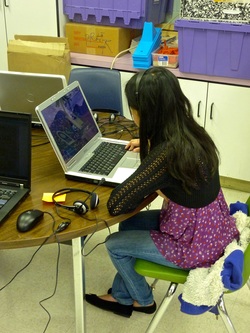
From 2007-2009 I worked as a co-PI on the team led by James Lester (NC State, Computer Science) to develop Crystal Island-Outbreak (NSF REC-0632450). This is an inquiry-based narrative-centered learning environment (NLE) created in the domains of microbiology and genetics for middle school students. Crystal Island features a science mystery set on a recently discovered volcanic island where a research station has been established to study the unique flora and fauna. The user plays the protagonist attempting to discover the genetic makeup of the chickens whose eggs are carrying an unidentified infectious disease at the research station. The story opens by introducing her to the island and the members of the research team for which her father serves as the lead scientist. As members of the research team fall ill, it is her task to discover the cause of the specific source of the outbreak. She is free to explore the world and interact with other characters while forming questions, generating hypotheses, collecting data, and testing her hypotheses. Throughout the mystery, she can walk around the island and visit the infirmary, the lab, the dining hall, and the living quarters of each member of the team. She can pick up and manipulate objects, and she can talk with characters to gather clues about the source of the disease. In the course of her adventure she must gather enough evidence to correctly choose which breeds of chickens need to be banned from the island.
This platform was my gateway into measuring monitoring judgments in serious games and also examining self-regulated learning more broadly.
This platform was my gateway into measuring monitoring judgments in serious games and also examining self-regulated learning more broadly.
Crystal Island - Outbreak Publications & Presentations
Nietfeld, J. L., Shores, L. R., & Hoffmann, K. F. (2014). Self-regulation and gender within a game-based learning environment, Journal of Educational Psychology, 106, 961-973.
Shores, L. R., Nietfeld, J. L., Hoffmann, K. L., & McQuiggan, S. W. (2009, June). An examination of individual differences in a narrative-centered learning environment . Annual meeting of Ed-Media, Honolulu, HI, USA.
Lester, J. C, McQuiggan, S. W., Nietfeld, J. L., Hoffmann, K. F., Robison, J. L, & Spires, H. A. (2009, April). Modeling metacognitive monitoring in narrative-centered learning environments. Annual meeting of American Educational Research Association, San Diego, CA.
Hoffmann, K. F., & Nietfeld, J. L. (2009, April). Teacher Assessment of Student Metacognition: Relationships Among Metacognitive Measures and Academic Achievement in Upper Elementary Students. Annual meeting of American Educational Research Association, San Diego, CA.
Nietfeld, J. L., Hoffmann, K. L., McQuiggan, S. W., & Lester, J. (2008, July). Self-regulated learning in a narrative centered learning environment. Annual meeting of Ed-Media, Vienna, Austria.
McQuiggan, S. W., Hoffmann, K. L., Nietfeld, J. L., Robison, J., & Lester, J. (2008, June). Examining Self-Regulated Learning in a Narrative-Centered Learning Environment: An Inductive Approach to Modeling Metacognitive Monitoring. To appear in Proceedings of the ITS'08 Workshop
Shores, L. R., Nietfeld, J. L., Hoffmann, K. L., & McQuiggan, S. W. (2009, June). An examination of individual differences in a narrative-centered learning environment . Annual meeting of Ed-Media, Honolulu, HI, USA.
Lester, J. C, McQuiggan, S. W., Nietfeld, J. L., Hoffmann, K. F., Robison, J. L, & Spires, H. A. (2009, April). Modeling metacognitive monitoring in narrative-centered learning environments. Annual meeting of American Educational Research Association, San Diego, CA.
Hoffmann, K. F., & Nietfeld, J. L. (2009, April). Teacher Assessment of Student Metacognition: Relationships Among Metacognitive Measures and Academic Achievement in Upper Elementary Students. Annual meeting of American Educational Research Association, San Diego, CA.
Nietfeld, J. L., Hoffmann, K. L., McQuiggan, S. W., & Lester, J. (2008, July). Self-regulated learning in a narrative centered learning environment. Annual meeting of Ed-Media, Vienna, Austria.
McQuiggan, S. W., Hoffmann, K. L., Nietfeld, J. L., Robison, J., & Lester, J. (2008, June). Examining Self-Regulated Learning in a Narrative-Centered Learning Environment: An Inductive Approach to Modeling Metacognitive Monitoring. To appear in Proceedings of the ITS'08 Workshop